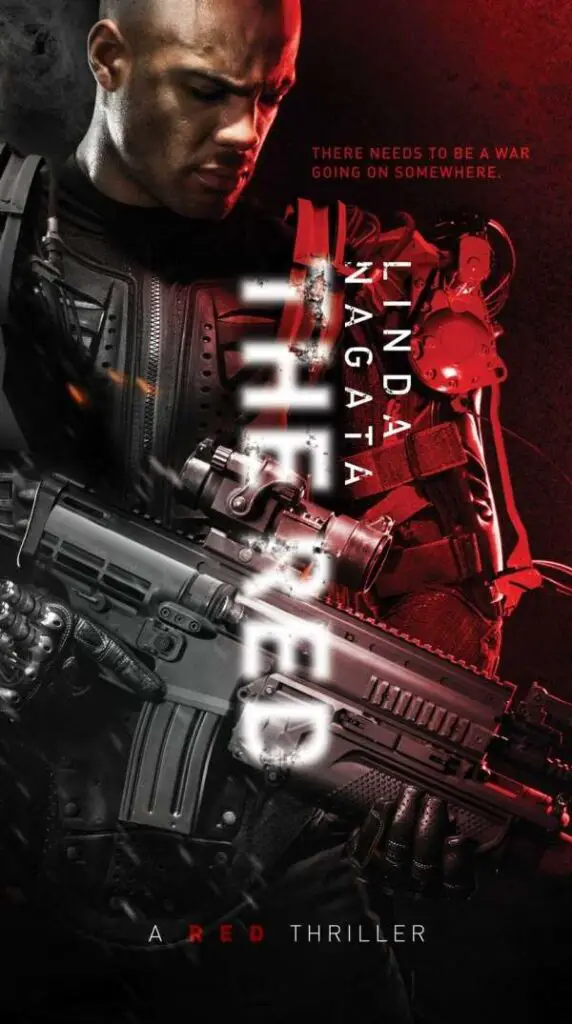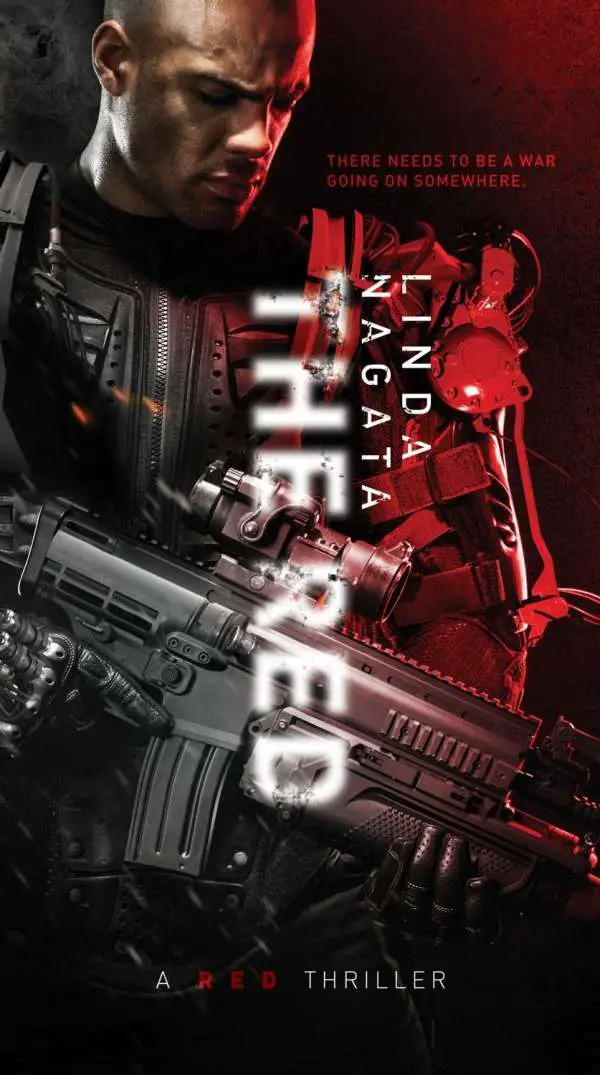The Red: First Light by Linda Nagata
The Red: First Light is the first book of a trilogy set in the near future where power mongers manipulate world systems for their own profit. Political, social, civilian, military, it doesn’t matter; they play the game at such a high level that even heads of state, chairs of major corporations and congressional leaders are nothing but pawns on their game board built with government dollars on the threat of war.

That’s what Lieutenant James Shelley tells his new non-com at the opening of The Red: First Light: ”There needs to be a war going on somewhere, Sergeant Vasquez. It’s a fact of life. Without conflicts of decent size, too many international defense contractors will find themselves out of business. So if no natural war is looming, you can count on the DCs to get together to invent one.”
Lt. Shelley knows his stuff. He’s the leader of an LCS – Linked Combat Squad; when on patrol, his soldiers wear exoskeleton armor and a networked skullcap over their shaved heads that allows not only for them to interface with each other, but also provides internal diagnostics and individually administered stimulants (or depressants, as the case may warrant) directly into nodes situated on their brains. As CO, Shelley is also “cyborged” with an ocular overlay from which he receives and relays data, an antenna tattooed along his jaw, and a tiny ear buds that link him to Guidance, a remote manned support structure feeding him information and orders based on the intel received from his implants and other surveillance systems.
But the strength of The Red: First Light is that despite these technological underpinnings, the story is about Lt. Shelley and his team as soldiers and comrades rather than as mechanically advanced weapons. After all – this is merely the state of contemporary warfare; part of the strategy is not only knowing your own capabilities, but anticipating the capabilities of your enemy.
And Shelley seems to know more than is strictly natural. He has an uncanny ability – premonition is all he can think to call it – to know when something dangerous is ahead: hidden combatants, impending conflict, ambushes. In his time as commander, he hasn’t lost a single soldier often due to his bringing them to alert status before the threat even develops. One of the members of his squad quips that Shelley is “beloved of God.”
Yet eventually it becomes apparent that this ability is perhaps not innate, but a manipulation – some sort of hack that can utilize any technology, any platform, to nudge actions and affairs of seemingly disparate individuals into a particular direction, affecting not only their own paths, but rippling out to affect larger affairs. Who created the hack, who is using it – what is using it – and to what end, is a complete and utter mystery. Even its very existence is nebulous, uncertain, not acknowledged.
Yet the Red (as it has been dubbed) has made Lt. James Shelley a hero – well, along with a sensationalistic media, much to his chagrin. It has also caused him great frustration. When you can’t trust that the little voice in your head telling you what choices to make, when you can’t be sure if it’s a part of your own experience or the reverberation of some unknown catalyst, how long will it be before you start doubting your decisions, your judgments, your very autonomy? That’s not a stable footing for anyone to have, but especially not a soldier.
Author Linda Nagata skillfully takes these ethical, technological, theoretical and martial considerations, and infuses them into a story that is strongly built on relationships. Despite the physical enhancements of Lt. Shelley, despite the moralistic drive to right the wrongs, despite his internal ruminations on the Red and how it may or may not be impacting his life, what keeps him centered and focused is his relationship with his squad, with his (ex)lover, his father, his activist friend. Even with his antagonistic relationships, it is this interaction, played off against his strong internal dialog, that allows this story to shine.
Not only do we get to know James Shelley, but we actually feel like a part of his unit. Their danger is our fear. Their triumph is our relief. Their loss is our grief and their training and discipline is that which gives us hope, even though for them, it’s simply the way things are, with no cheap, melodramatic kills, no poignant deathbed confessions, no clichéd bittersweet moments.
As the narrative progresses and the stakes become higher, we are already so invested in the characters that we can effortlessly follow along with them. Lt. Shelley, yes, but also his commanders and those who serve under him or alongside him. As a reader, that’s a good place to be, as it allows the story – both internal and external – to unfold with a sense of immediacy and consequence unhindered by clever twists, skillfully deployed red herrings or convenient cavalries saving the day. This one feels genuine, folks. And it’s just starting. The entire trilogy is not to be missed.
— Sharon Browning

